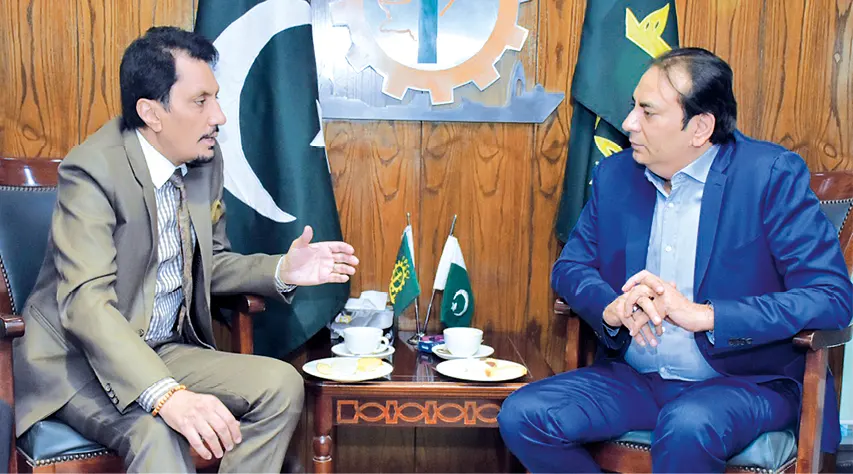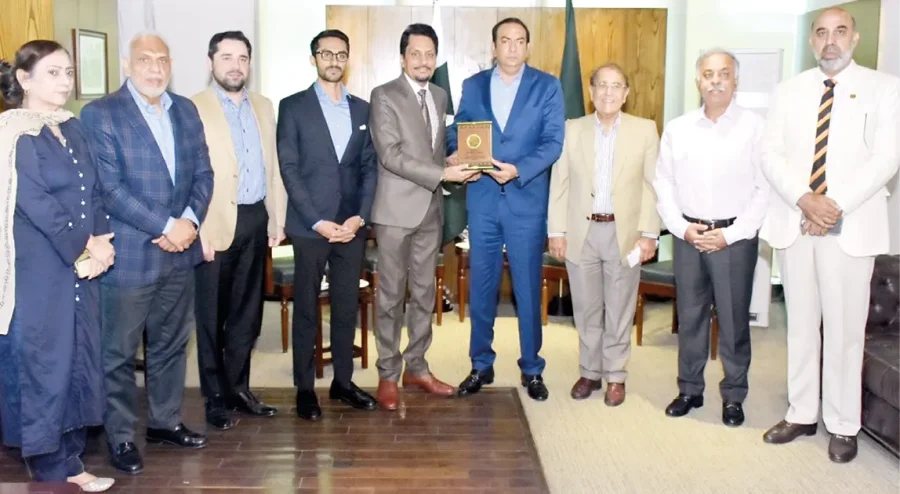Faisal Malik commends FPCCI’s measures for enhanced business activity, economic revival
Pakistan’s business community is united for the economic revival of the country and being the apex body, the Federation of Pakistan Chambers of Commerce & Industries (FPCCI) has spearheaded a campaign to attract international investors and companies to invest in Pakistan’s market.
These views were expressed by President of the FPCCI, Atif Ikram Sheikh while exchanging views with Chairman and Editor-in-Chief of Pakistan Mr Faisal Zahid Malik who along with Founder & CEO of The Daily CPEC, Mr Saud Faisal Malik called on Mr Sheikh and his team to discuss matters related to business, trade and investment. Vice President FPCCI Mr Tariq Jadoon, Chairman FPCCI Islamabad Karim Aziz Malik, former President FPCCI Islamabad, Muhammad Ahmad, Chairman Coordination FPCCI Mr Malik Sohail and former VP FPCCI Mr Tariq Sadiq were also present in the meeting.
Mr Sheikh briefed Mr Faisal Malik about the current business scenario—challenges and opportunities— as a result of the incentives announced by the government to attract investment in the country. We at the FPCCI have constituted a think tank on Pakistan’s Economic Revival and Growth (FPCCI-PERG) to convince the foreign investors that Pakistan market offers an ideal opportunity for the growth of their capital as there are multiple incentives and transparent business opportunities recently launched by Prime Minister Shehbaz Sharif’s financial team, he said.

On the recent standoff between the traders and the government, he said the FPCCI’s stance was very clear i.e. there should be a uniform tax base, simplification of the filing system, taxation reforms that make economic sense and an end to harassment or maladministration in the taxation machinery. Being an apex body we are also trying to resolve differences between the business community and the government, he said adding, the WHT accounted for 70 percent of all the direct taxes collected in sales tax mode in the country as per FY24 data and this number is alarming to say the least.
He highlighted that the government would have to bring a supplementary finance bill 2025 or a mini-budget in order to implement any increase in WHT. A mini-budget always brings investor’s confidence down resulting in flight of capital, closure of industries and fuels mistrust with trading partners of exporters, he said.
Mr Faisal Malik appreciated the FPCCI’s role in business growth and urged the business community to extend cooperation to the government in introducing tax reforms and implementing financial discipline. Prime Minister Shehbaz Sharif’s government has already launched an austerity drive that is aimed at reducing unnecessary expenses and curtailing rather than abolishing the non-profitable units and divisions, he said. Similarly, the Special Investment Facilitation Council (SIFC) has also introduced a number of reforms to create a business and investment-friendly environment in Pakistan which is a positive sign for Pakistan’s economy, said Mr Faisal Zahid Malik.
He said that the only workable solution to generate more taxes is to generate more economic activity through drastically reducing SBP’s key policy rate, rationalizing electricity and gas tariffs vis-à-vis regional competitors, bringing continuity and reliability in macroeconomic policies and broadening of tax-base to the untaxed, he added.










